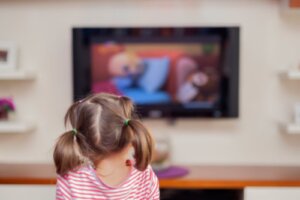How to Choose Suitable TV Programs for Children


Written and verified by the psychologist Elena Sanz
Children today are digital natives. They’ve been born into a world in which technology is the protagonist, where screens and the Internet have become part of life. Therefore, keeping them away from electronic devices isn’t necessarily always possible or beneficial. On the other hand, it’s crucial to know how to choose suitable programs for them to watch.
It must be remembered that the audiovisual content to which children are exposed has a great impact on their minds. It shapes and affects their brain connections and sensory processing. Moreover, in these little ones who are still blank canvases, it models their values, attitudes, and behaviors
So, how can we find out which tv shows are the most suitable for children? We explain.

The importance of choosing suitable tv programs for children
You might think that technological screens and devices aren’t particularly recommended for children. However, most youngsters come into contact with technology at an early age. Indeed, for some parents who are always in a hurry, with little time and several obligations to fulfill, a mobile game or a series on the tablet can be a true lifesaver in entertaining their children.
In addition, as digital natives, children are extremely comfortable with screens and really enjoy them. Moreover, they can learn and improve their skills while watching their favorite series. However, there are certain parameters that must be considered in this regard. That’s because not all exposure to multimedia content is beneficial.
No screens before two years
The first point to consider is that children under the age of two shouldn’t be exposed to screens. It’s a recommendation supported by multiple experts and associations in light of certain investigations on the effects of exposure to screens on a child’s development.
At these early stages of life, the child’s brain is extremely underdeveloped. It’s also going through important changes in volume, structure, and neuronal connectivity. For these changes to happen properly and for this critical period to be successful, the infant needs to interact with their real environment. For instance, to move, manipulate objects, and, above all, interact with their caregivers and be stimulated by them.
Screens not only hinder the performance of these essential activities by taking up time but can also generate a series of problems and long-term consequences. For example:
- Attention problems and increased risk of ADHD symptoms.
- Cognitive and language delays.
- Increased impulsivity and difficulty with impulse control.
- Sleep disturbances.
- States of permanent excitement.
- Difficulties in the development of empathy and in the ability to capture non-verbal signals.
Therefore, during these first years of life, it’s recommended that children’s exposure to screens be limited as much as possible.
Choosing suitable programs for children
After the age of two, certain audiovisual entertainment can be incorporated into children’s routines, but in a limited way. For instance, for those under five, it shouldn’t occupy them for more than one hour a day. In addition, the content must be educational and of good quality.
However, what does this mean? In fact, there are several factors to take into account when choosing suitable children’s programs. For example, the presentation of the images, the selection of the shots, the narrative rhythm, and the background music.
There are certain children’s programs (such as the famous Cocomelon ) that are especially addictive for children. These programs seem to almost hypnotize them by totally capturing their attention. In effect, they keep them staring at the screen for hours. This is due to hyperstimulation.
These children’s series include extremely short scenes, rapid shot changes, and really striking and simultaneous lights and sounds. These negatively affect their executive abilities. That’s because children’s attention is captured through the sensory cortex and not the prefrontal cortex. In fact, it’s been proven that ten minutes of exposure to tv are enough to notice the different effects caused by an appropriate instructional program and a fast-paced one.
What values do you want to instill?
It’s also important to consider the content of children’s programs, the language they use, and the values they transmit. For example, it’s essential that children’s series convey universally accepted values such as the importance of family, solidarity, honesty, effort, or respect for differences.
However, it’s also important that the narration isn’t limited to the specific actions of the characters, but also puts emphasis on the reflection of the before and after. In other words, it should teach children to anticipate and face consequences. These recommendations stem from a study conducted by the College of Pedagogues of Catalonia (Spain), which analyzed some of the main children’s series and their associated values. It states that, although some programs such as Maya the Bee and Paw Patrol encourage altruism and camaraderie, others aren’t so positive.
For example, in Pocoyo, the protagonist could be viewed as rather lonely as his family doesn’t appear. While in Peppa Pig, the protagonist is a rather unstable character with a stubborn attitude and little emotional control. For children, their favorite cartoons are often an example to follow. Therefore, if they aren’t the best role models, it can be problematic and affect their ability to relate to their peers and teachers.

Choose suitable programs and watch as a family
One last recommendation is the importance of watching tv with your children. If you’re present, you can initiate a conversation about what they’re watching and provide guidance, ask them questions, and invite them to reflect and think critically.
This won’t only strengthen the bond between you, but will also make your child’s viewing experience far more educational and enriching. It’s also a way of preventing them from adopting any inappropriate behaviors or attitudes portrayed on the screen. In short, choosing suitable tv programs is decisive for their brains and emotional and social development. For this reason, it’s an extremely important practice.
All cited sources were thoroughly reviewed by our team to ensure their quality, reliability, currency, and validity. The bibliography of this article was considered reliable and of academic or scientific accuracy.
- Gómez Serés, M. V. (2017). Series infantiles. Una aproximación de análisis pedagógico. Colegio Oficial de Pedagogía de Catalunya. https://www.pedagogs.cat/reg/es/3244
- Soni, A., & Srivastava, S. Growing Cartoon Trends Pose as Hyper-stimulant to Adolescents that Cultivates Addiction, Impair Creativity, and Inhibits Arithmetic Efficiency. https://doi.org/10.31234/osf.io/zpfs5
This text is provided for informational purposes only and does not replace consultation with a professional. If in doubt, consult your specialist.








